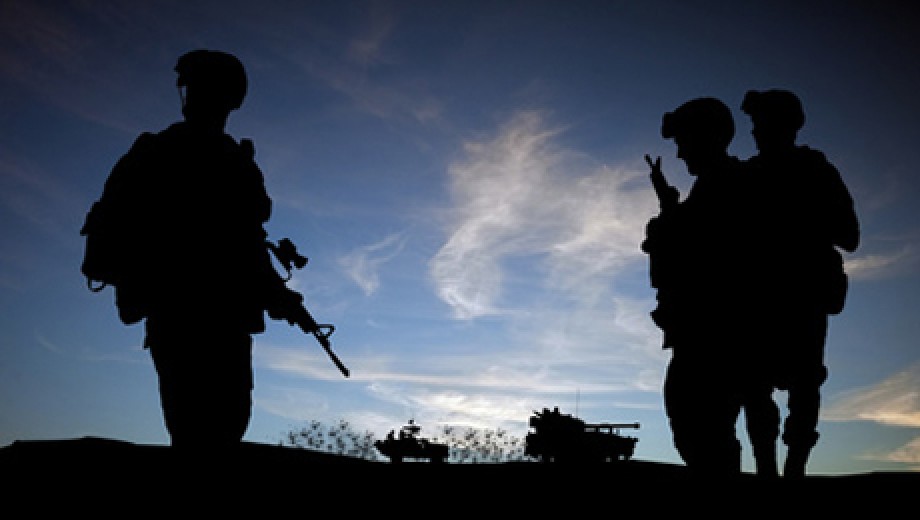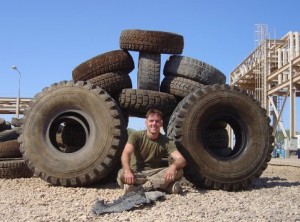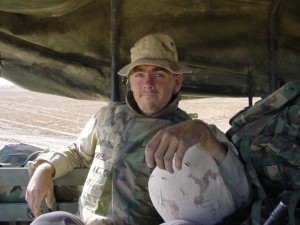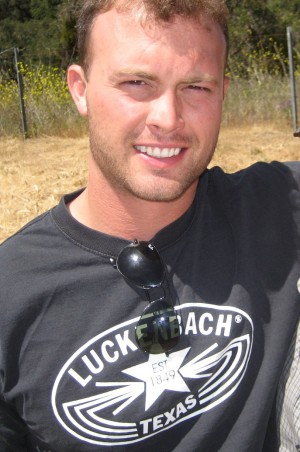When soldiers return to civilian life, they are often surrounded by people who haven’t shared their experiences. Three veterans who traded military service in Iraq for graduate studies in the humanities share their stories.
By the time he was 32, Eric McMillan had served in Bosnia, deployed twice to Iraq, and commanded a company of 167 soldiers during a year of intense combat in the Iraqi province of Diyala.
“I would walk in the door at 0600 hours and the whole building would snap to attention,” he says. “I was used to being a military officer.”
Three months after his honorable discharge, McMillan, AM’10, traded the life of an Army captain for the life of a student in the division’s Master of Arts Program in the Humanities (MAPH)—a transition that wasn’t without the occasional moment of culture shock.
“I lived, breathed, slept a war, twice. Lost men. Was involved in a lot of really heavy fighting. Made the kinds of morally ambiguous and complex decisions that people will probably never face in their entire lifetime,” he says. Spending a year with students who hadn’t done the same “just felt so weird,” he admits.
Active duty military personnel make up a small percentage of the US population—less than one percent. When soldiers return to civilian life, and particularly to academic life, they are likely to find themselves surrounded by people who haven’t shared their experiences.
“Most people have no idea, and they know they have no idea, what you did,” says MAPH alum Robert Greene, AM’11.
Yet for Greene, McMillan, and fellow veteran Josh Cannon, now a PhD student in Near Eastern languages and civilizations, academia has its benefits, too. Cannon is pursuing his childhood dream of becoming an archaeologist, while Greene and McMillan had the opportunity to reflect on and write about their military service.
“If you’ve been more or less institutionalized by the Army for ten years, which is what I was, your grasp on being able to effectively analyze that whole set of experiences gets skewed a bit,” says McMillan, who is working on a novel inspired by his time in Iraq. He came to MAPH because he knew he wanted to write about his participation in the war, and “I had to put my experience through a whole bunch of different lenses in order to step back and get the distance I needed to tell the story.”
“To most people, a veteran is a veteran is a veteran. Their reaction is, ‘You served. Thank you for your service,’’’ says McMillan. Many civilians don’t realize how different the same war can be for each soldier.
Cannon, a former Marine, is quick to admit his experience was “very different than a lot of my peers.” Cannon studied Arabic at the Defense Language Institute, and during his two tours in Iraq he did varied work as a translator. Sometimes he would spend his days listening to intercepted wireless communications, trying to uncover insurgent attacks in the making. At other times, he would act as an interpreter for his commander.
“I spent a year of my life chatting with Iraqis,” says Cannon, who “cherished” his role as a listener. Because he spoke Arabic—a rarity among American military personnel—he was able to build relationships with many of the Iraqis he met, who welcomed the opportunity to discuss their frustrations about the war.
He quickly became the beneficiary of Iraqi hospitality. When Cannon mentioned he was hoping to find a copy of Homer’s Iliad in Arabic, he didn’t have to look for long. “I got, like, four copies,” he says with a laugh.
Though he saw relatively little combat, Cannon’s time in Iraq was far from relaxed. During a mortar attack on his compound, “I remember getting mad,” he recalls. “Instead of being scared that stuff’s falling from the sky and exploding, I thought, ‘Why are they trying to kill me? If I would have met this person, I would have chatted to him in Arabic, and I would have tried to be his friend.’ I took it too personally, obviously.”
Both McMillan and Greene saw intense combat during the surge in 2007—McMillan as a commander and Greene as an infantryman.
In the rare downtime between patrols and raids, Greene read novels by Dostoyevsky, as well as works by writers from the Middle East. The Egyptian novelist Naguib Mahfouz quickly became a favorite. “When you read the literature of a culture you’re unfamiliar with, they immediately cease to be as alien to you,” he says.
McMillan struggled with the impossible moral quandaries he faced as a commander. “You have two primary responsibilities—one is to the men, and the other is to the mission. That’s the fine dance of it. Sometimes no matter what you do, somebody is going to get killed.
“Your men will train really hard. You’re going to plan as carefully as you possibly can. You’re going to make sure that they execute as methodically as they can. But still, you don’t control everything out there,” he says. “Internally, the thing that you have to learn is how to accept that in order to do your job.”
During his time in MAPH, Greene found comfort in “the quiet life of reading and talking about books. … It was a very quiet, enjoyable, invigorating year.” For his thesis, he began to work on a novel based on his military experiences (“horrible albatross, pain in my you-know-what,” he says of the writing process). He has also completed a creative nonfiction account of his time overseas, Nightcap at Dawn: American Soldiers’ Counterinsurgency in Iraq, written in collaboration with several of his fellow soldiers. The book, published in April 2012, explores the war in Iraq from the point of view of enlisted personnel trying to learn counterinsurgency strategy in the middle of the conflict.
Writing about the war has been “a double-edged sword” for Greene. It can be difficult to relive the experience, but “sometimes it’s good to go back to think about things.”
Cannon, now in the final stages of writing a master’s thesis about a Bronze Age site in Turkey, has discovered that his military experience serves him well in his graduate work. The physical discomfort associated with archaeological excavations—no sleep, bad weather, bland food—never ruffled him.
"When you read the literature of a culture you're unfamiliar with, they immediately cease to be alien to you," says Greene.
In fact, he was surprised to discover he found reassurance in the similarities between fieldwork and military life. “When we went to Iraq, we called it ‘going into the field.’ The terminology was even the same,” he says. On one excavation, he noticed the director always locked their equipment in a small room that instantly reminded him of the rooms where intelligence information was stored. “I found myself slipping into this mentality: ‘I am a Marine, I know where the Secure Compartmentalized Information Facility is, we’re in the field’...There was this comfort of, ‘I used to do this a lot.’”
McMillan was able to keep a cool head, even when his fellow students were stressing over papers and exams. “When I looked around at my fellow students, who were stressed out about this paper, or the other paper, I was like, ‘Well, it’s gonna get done. I know it’s gonna get done,’” he says. “Nobody’s shooting at you today. It’s a good day.”
Postscript: Coming Home Stronger
Just after he was discharged, Robert Greene and a friend drove from Fort Bragg to the home of a fellow solider who had died in Iraq.
“We ate, we drank. We were glad to be out and to still be breathing,” he says.
Coming home had its pleasures—“the food mainly,” Greene says—and its challenges. “The first time I went to a shopping mall, it was a little bit odd,” Josh Cannon remembers. “I hadn’t been in a crowd without a weapon, or without being in a Humvee.” But the anxiety quickly dissipated. “What helped was doing it over and over,” he says.
For his part, Eric McMillan hopes the public focus on post-traumatic stress disorder won’t define his generation of veterans. “Nobody can go through a war and not be just a little bit changed,” he argues. “Everyone comes back with post-traumatic stress, but only for a few will it become a disorder. That’s what grabs a lot of the attention.”
He doesn’t want his fellow veterans to be remembered as “a generation of victims, of messed-up guys,” he says.
“There’s also an opportunity for veterans who went through that experience to have learned something, to have become stronger and richer people. I think that’s the message I’m more interested in trying to spread, or at least draw attention to.”
Read "This Father's War," a guest post by Eric McMillan in The Atlantic.





Comments
only for a few
“Everyone comes back with post-traumatic stress, but only for a few will it become a disorder. That’s what grabs a lot of the attention.”
As an Iraq war vet and a alumn of one of the grad programs it really troubles me that the captain would say something like this. An estimated 17% of veterans who saw combat experience severe PTSD. I don't know if that would ever qualify as "a few" in my book. And, this doesn't take into account the fact that the DoD decided to discontinue using the definition of PTSD found in the DSM-III in order to under diagnose soldiers and bring down theses rates. Perhaps a walk around Washington Park, or even the loop, where some of the homeless vets of our generation are would help the captain out with some perspective. Their not that hard to spot. Most soldiers don't have the education, the mental faculties, or the support system that someone who is fortunate enough to attend U of C has. Perhaps the captain should be worried less about being labeled a victim and more about how he can help those that fought along side him.
Victim Mentality, a response to "Anonymous"
Veterans MUST NOT become another victim group!
I am an Iraq war vet and alumn of the MAPSS program. I commend Mr. McMillan for insisting on dignity and mental strength. Mr. Anonymous above would prefer that veterans take the path of victimhood; wallowing in the mire of self-pity.
Veterans of the Iraq and Afghanistan wars (I served in both) have the power to cope with life back home. The worst thing that could happen is to overdiagnose PTSD and create another class of victims in America. We have enough victim groups as it is, and as we can all see, once a group is defined as "victim," it never looses the label, and there is a never-ending incentive to perpetually maintain that victim status. Worst of all, none of the groups in America that have been labeled victims have managed to recover from the affliction of that label.
6,440 servicemembers have died in Iraq and Afganistan over the course of ten years. By way of comparison, 2,400 Marines were killed on the first day of the battle for Iwo Jima. Try that on for "perspective" Mr. Anonymous. Every life lost in Iraq and Afghanistan was precious, but if you think today's veterans have it worse than any other generation that fought, you are kidding yourself. We have nearby medic stations, medivacs (helicopter ambulances), morphine, and body armor. Nobody spits on us when we come home. Given the body counts and casualty counts of WWI, WWII, or Korea compared with today, we had it easy. It is our choice to adopt a more positive, resilient perspective, or instead to sink into victimhood. The men who came home from WWII earned the title "The Greatest Generation." They also complained less, sought less "help," and drove on to be good men back home without trying to cash in on their emotional troubles.
PTSD is being obscenely overdiagnosed. Given the body count in WWII compared with our wars today, it would be statistically impossible to argue that, for instance, more Americans have seen a fellow service member killed. We have seen less death and bloodshed. Anyone who doubts the veracity of that statement should sit down and do some algebra comparing casualties per year in WWI, WWI, Korea, or Vietnam, compared with today.
The over-diagnosis of psychological disorders in this country should be a national scandal. Everyone is looking for a cheap and easy way to feel better without being a better person. Unfortunately, people like Anonymous want to give veterans an excuse to join the legions of victims and moochers. The fact that there are homeless vets in Washington Park means nothing. There are all sorts of certifiable dirtbags in Washington Park. Just because someone wore a uniform once doesn't mean they can't be a dirtbag. Times are tough for everyone, and they need to start at the bottom like everyone else. As a veteran, I can say that veterans often times think that civilian work is beneath them. That mentality is probably weighing down the people in Washington Park.
PTSD is a racket, just like disability. There are always exceptions, but let's drop the pretenses. 45% of new veterans are filing for disability, more than in any other war. There is no imaginable way to justify that 45% figure. There is a massive amount of abuse, fraud, and misdiagnosis occurring. At root this represents a failure of character, abetted by the therapeutic culture and welfare state. The victim mentality will curse those veterans who fall into it.
Most people "suffering" from PTSD could do what the men who came home from WWII did. The message for veterans is simple: don't complain, don't feel sorry for yourself, and get a job- any job. If you feel bad, find someone to talk to (preferably without paying them) and get on with life, proudly. Don't be cannon fodder for the American victimhood lobby, unless you want to end up like the other official victim groups in this country.
John T. Bennett
MA, University of Chicago (Master of Arts Program in the Social Sciences) '07
I think I remember Cannon
I think I remember Cannon from back at the USMC DLI detachment... I was there from 2000 to 2002.
I enlisted in the Marines after 2 years at Chicago as an undergrad. After 5 years of duty, I returned to Chicago to finish a bachelor's in East Asian Languages and Civilizations. Then I did a year of MAPH.
The number of undergrads that were/are also Marines must be quite small.
It would be hard to envision two more-different societies.
I remember a few friends of mine got arrested by U of C police for protesting a USMC recruiter on campus - I helped them organize a defense and get a lawyer, then the school dropped the charges in a closed meeting.
hey cannon - you're not a Chicago man until you graduate! good luck and semper fi!
There's a few U of C grads
There's a few U of C grads that have gone the other route too. Both directions have unique challenges. Both experiences provide insite to a complete unique and somewhat isolated culture. Both cultures don't particularly like each other. It's interesting to see both from inside.
I ran into....
Yes, that's true.
I ran into some officers in Okinawa that were U of C grads. Footballing Fiji's.... those guys were huge! Economics majors turned USMC officers.....